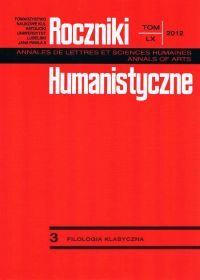Melite, or an Apology of Womanhood as Presented in The Story of Leucippe and Clitophon by Achilles Tatius
Abstract
In the plot of The Story of Leucippe and Clitophon by Achilles Tatius Melite, a heroine pictured quite differently than women in all other ancient Greek novels, plays an important role. This article attempts at answering these three questions: first, which aspects are decisive when it comes to the originality of the female portrait of interest to us; second, what the function of this portrait is; and finally, whether this portrait decodes the meanings significant for a broader discussion on the stereotypical and critical portrait of womanhood in the Greek literary tradition. The analysis of the novel in question allows us to formulate a thesis that the originality of Melite’s portrait is closely connected to its realistic and moralistic traits, these being an effect of a game of character types and gender standard which the novel’s author plays with the audience. For the purpose of attaining the expected effect the intertextual associations with the novel Callirhoe by Chariton and Plutarch’s Amatorius have also been taken into consideration.
References
Bachtin M.: Problemy literatury i estetyki, przeł. W. Grajewski, Warszawa 1982.
Bartsch S.: Decoding the Ancient Novel. The Reader and the Role of Description in Heliodorus and Achilles Tatius, Princeton 1989.
Brown P.: Ciało i społeczeństwo. Mężczyźni, kobiety i abstynencja seksualna we wczesnym chrześcijaństwie, przeł. I. Kania, Kraków 2006.
Cieśluk M.: Komizm w teorii i praktyce antycznej powieści greckiej, „Symbolae Philologorum Posnaniensium Graecae et Latinae” 20 (2010), z. 2, s. 39-53.
Cresci L.: La figura di Melite in Achille Tazio, „Atene e Roma” 23 (1978), s. 74-82.
Effe B.: Entstehung und Funktion “personaler” Erzählweisen in der Erzähliteratur der Antike, „Poetica” 7 (1975), s. 135-157.
Egger B.: Zu den Frauenrollen im griechischen Roman. Die Frau als Heldin und Leserin, „Groningen Colloquia on the Novel” 1 (1988), s. 33-65.
Foucault M.: Troska o siebie, w: tenże, Historia seksualności, przeł. T. Komendant, Gdańsk 2010.
Fusillo M.: Il romanzo greco. Polifonia ed eros, Venezia 1989.
Haynes K.: Fashioning the Feminine in the Greek Novel, London and New York 2003.
Hägg T.: Eros und Tyche. Der Roman in der antiken Welt, Mainz 1987.
Holzberg N.: Powieść antyczna, przeł. M. Wójcik, Kraków 2003.
Johne R.: Women in the Ancient Novel, w: The Novel in the Ancient World, ed. G. Schmeling, Boston–Leiden 2003, s. 151-207.
Kuch H.: Der antike Roman: Untersuchungen zur literarischen Kommunikation und Gattungsgeschichte, Berlin 1989.
Markiewicz H.: Wymiary dzieła literackiego, Kraków–Wrocław 1984.
Perry B.E.: The Ancient Romances. A literary-historical Account of their Origins, Berkeley–Los Angeles 1967.
Polaszek E.: Sztuka portretowania postaci w romansie greckim, Wrocław 1984.
Polaszek E.: Realizm i fantastyka w starożytnej powieści greckiej, Kraków 1998.
Reardon B.P.: Achilles Tatios and Ego-Narrative, w: Oxford Readings in The Greek Novel, ed. S. Swain, New York 1999, s. 243-258.
Reardon B.P.: The Form of Greek Romance, Princeton, New Jersey 1991.
Rohde E.: Der griechische Roman und seine Vorläufer, Leipzig 1914.
Romilly J. de, Tragedia grecka, przeł. I. Sławińska, Warszawa 1994.
Whitmarsh T.: Narrative and Identity in the Ancient Greek Novel. Returning Romance, Cambridge 2011.
Wolff S.L.: The Greek Romances in Elizabethan Prose Fiction, New York 1912.
Wypustek A.: Magia antyczna, Wrocław 2001.
Wypustek A.: Życie rodzinne starożytnych Greków, Wrocław 2007.
Copyright (c) 2012 Roczniki Humanistyczne

This work is licensed under a Creative Commons Attribution-NonCommercial-NoDerivatives 4.0 International License.





